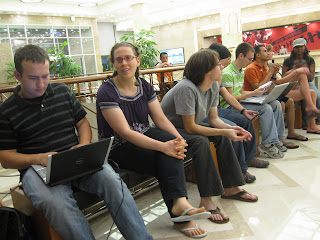It seems that Korean history focuses on the lives of individual men rather than specific events. The founder of Hyundai, Assan, had his own memorial museum praising his family values, work ethic, humbleness, and patriotism. It felt overdone, but the old Korean tourists there seemed to love it. It became apparent from the tours that company pride and propaganda are regarded in a much different way than the States. Every company or institution we visited had an introductory movie about itself. They tended to make very broad and almost philosophical claims, like steel production and nature are meant to exist side-by-side. The companies do hold environmental concerns quite highly (there was an impressive amount of trees at the manufacturing plants and a lot of recycling going on), but many aspects of their advertising were jarring.
We had lunch at a vegetarian buffet restaurant, and I was full off just one plate! At all the other buffets I had been getting at least three plates of food before hitting the ice cream and coffee. We made some stops along our road trip by the Sea of Japan (known to Koreans as simply the East Sea) including a beach near the underground tomb of King Munmu, buried to become a dragon and protect the eastern shore from invasion.

Viktor does his camera pose.

And takes the shot.
We also visited a hill grave containing an unknown man, significant because the unmarked grave is for royalty and some of the statues have Caucasian features.Viktor's picture of the hill grave.
We sat down to another traditional Korean meal, this time with 11 (!) courses. It was as amazing as it sounds. They all were tasty, but there were too many to put here so I’ve put them on the web album.
People were up for norae bang (karaoke) back at the hotel, so we got some beers and belted it out in our room. We went back to the Rose Garden on the lake and watched football over drinks before retiring for the evening.
Blogtime.
Farzad befriends the Russian children.
Karaoke time.







No comments:
Post a Comment